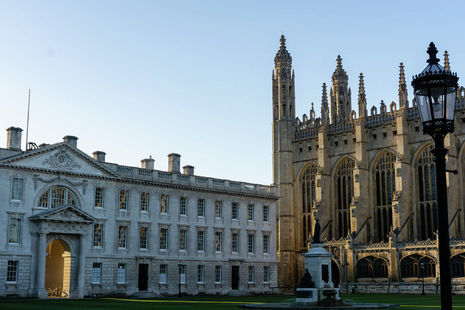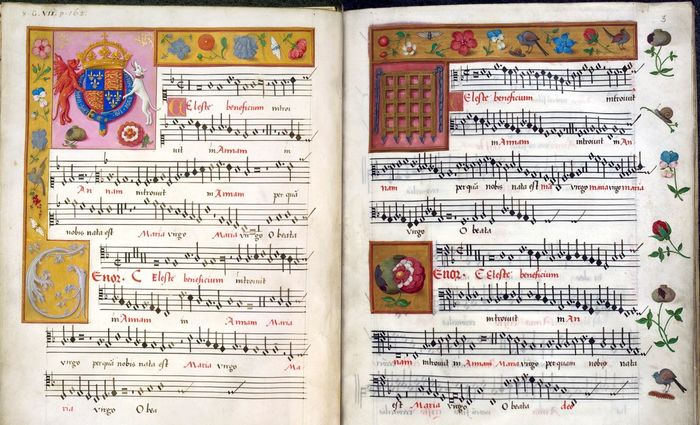For the love of evensong
Elsie Hayward explains why you might like to attend evensong, even if you’re not a Christian

Choral evensong is one of those special Cambridge things many of us are not exploiting enough. To be clear from the start: this is by no means coming from a place of devout Christianity. And when, in Michaelmas term of this year, a friend got it into his head that we should go and experience it, I was slightly alarmed by the prospect of cutting off our working day early to run off to a chapel. I didn’t know I was going to discover another reason to feel lucky to be at Cambridge. And in fact, the spontaneity of our decision to catch evensong in Trinity College chapel turned out to be a large part of its charm. It was a kind of reminder that we are adults with free will, and we can enjoy our Cambridge experience however we like.
Evensong is actually part of our shared history: it is largely the creation of a Cambridge man, Thomas Cranmer, who studied at Jesus College from 1503 to 1515 before being elected to its fellowship. The service derives from the traditional daily canonical ‘hours’ sung in Roman Catholic monasteries, cathedrals, and some parish and collegiate churches. When Cranmer as Archbishop of Canterbury wrote the Book of Common Prayer in 1549, during the English Reformation, he combined the evening hours of vespers and compline to create evensong. Today, the term ‘choral evensong’ refers to a service in which a choir sings composed settings of liturgy, including responses, psalms, canticles, and anthems. There will likely be a congregational hymn that everyone sings, but for most of the service the congregation simply listens.
“Evensong is actually a part of our shared history”
I understand that it can be hard to separate a manifestly religious service from religion – if, that is, the religious aspect would be a barrier for you. That said, if you have an artistic appreciation for beautiful things, I really don’t think you’d fail to get something out of it. For starters, some of the chapels in Cambridge are stunning enough that you could sit there, not listen to a single word or note of the service and not feel that your time was wasted. I remember the overwhelming feeling of awe that came with stepping into King’s College chapel for the first time. Having seen it on TV every year at Christmas for the Festival of Nine Lessons and Carols for as long as I could remember, it felt a bit like meeting a celebrity. But nothing can compare with actually sitting in a space that was described in The Guardian as a “gravity-defying hall of light” and making direct contact with its splendour and its history. You don’t have to feel like you’re communing with God. You can commune with everyone who has sat where you are sitting before you, with the people who built this place, and with whatever sublime vision was behind its design. Or maybe just with your own thoughts.
I don’t think anything can quite parallel a choir in full force, harnessing the transcendent power of sound”
And then there is the music. I’ll admit, I have always been a sucker for choral music. I’m no kind of musical expert, but I know there is something that feels so right to the ear about that kind of harmony. I sang in my church choir as a teenager for the sheer love of the music, and to hear it performed with such quality in Cambridge is a great privilege to me. I don’t believe you have to know anything about the music or be able to understand Latin (but that helps) in order to appreciate it. It’s enough to just sit there and let the sound wash over you. Even after arriving for evensong at King’s too late for admittance to the quire on one occasion (beware the 45+ minute queue), the music found me easily toward the back of the antechapel. Those performers are truly world-class, and in Cambridge they’re right on our doorstep. I don’t think anything can quite parallel a choir in full force, harnessing the transcendent power of sound. And you can listen to some of the best in the business for free.
Not every evensong is like King’s, though. My first experience was at Trinity, and in a smaller space with far fewer tourists, the atmosphere is more intimate and relaxed. It’s the kind of thing it’s possible to do on a whim, when you just want to get out, have a change of scene, find some peace. I go to Robinson, and I’ve even been known to haunt my own chapel sometimes on a Tuesday evening. I enjoy gazing into the John Piper stained glass window (one of our very few aesthetic claims to fame), but I have to recognise that in this scenario I am not there for the setting, which is as redbrick as everywhere else in college.
I believe that there is value in a pause at the end of the day, whether it involves liturgy or not. It is worthwhile, in the middle of a Cambridge week, to be forced to sit still and do nothing – nothing but listen, think, and look up at something beautiful. With remarkably little effort or commitment required, evensong is an ideal way to achieve this.
 News / Judge Business School advisor resigns over Epstein and Andrew links18 February 2026
News / Judge Business School advisor resigns over Epstein and Andrew links18 February 2026 News / Hundreds of Cambridge academics demand vote on fate of vet course20 February 2026
News / Hundreds of Cambridge academics demand vote on fate of vet course20 February 2026 News / Petition demands University reverse decision on vegan menu20 February 2026
News / Petition demands University reverse decision on vegan menu20 February 2026 News / CUCA members attend Reform rally in London20 February 2026
News / CUCA members attend Reform rally in London20 February 2026 News / Caius students fail to pass Pride flag proposal20 February 2026
News / Caius students fail to pass Pride flag proposal20 February 2026










